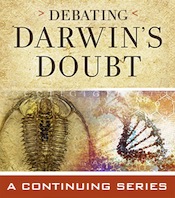 Evolution
Evolution
 Intelligent Design
Intelligent Design
Status Transactions in the Darwin Debate
 You’ll never really understand the evolution controversy until you grasp the extent to which personal status enters into it.
You’ll never really understand the evolution controversy until you grasp the extent to which personal status enters into it.
My wife has been reading a book about improvisational theater, Impro, by an acting teacher named Keith Johnstone. He writes about having a revelation, as an instructor in improv, when he tried to remind his students about how every human interaction is potentially a status transaction. Typically, one person is in the higher status role compared to the other, a position that is often switched back and forth in the course of a single conversation.
Johnstone recalls how before he realized this, his students’ improvisations were lifeless, because they were not true to life. They came alive when he reminded the actors of this subtle but pervasive element in the way we interact with each other. Comedy, he observes, is frequently the result of a presumably higher status person being put in a lower status position, or vice versa. Think of Jeeves the snooty, philosophizing valet who thoroughly dominates his employer, the upper-class twit Bertie Wooster.
The question of how life originated, and by what force or mechanism it developed and diversified, is a scientific question. But the debate about intelligent design, as it’s carried out in popular and even scientific media, is laden with extraneous yet revealing status-related interactions.
A familiar illustration is the habitual attempt to stick intelligent-design advocates with the tar baby of Young Earth Creationism, fundamentalism, and other forms of low-status religious expression. ID has nothing to do with creationism, but it doesn’t matter. This is the whole point of the invention of the term “Intelligent Design Creationism,” of which the Darwin-lobbying National Center for Science Education is a champion. It’s the point of Jerry Coyne’s absurd précis of Stephen Meyer’s book Darwin’s Doubt, “Yes, baby Jesus made the phyla!” — which he’s repeated in several different forms (“Stephen Meyer attributes the Cambrian Explosion to Jesus“) — without ever attempting to reply to or even accurately summarize the argument of the book.
Jesus is never mentioned in Darwin’s Doubt. Nor is “Jebus,” as Coyne sometimes spells the name to emphasize the low-status element. However Coyne, paladin of Darwinian theory, feels he has done his job if he can associate the book with what he regards as a down-market, Bible-belt form of Christianity.
 These people don’t seem to realize how transparent they are. Take Nick Matzke, whose overnight “review” of Darwin’s Doubt appeared at Panda’s Thumb the day after the book was published. Due to its great length and technical language, the review impressed many people who didn’t choose to read the book itself, or who realized they couldn’t answer its arguments, but knew they needed to dislike it anyway. Matzke hardly addressed the main case for ID that Meyer offers. Instead, the objective of his post was to pull rank with a spray of false accusations of errors and ignorance — typical example, “The ‘body plans’ did not originate instantaneously, all at once, unlike the ignorant contentions of creationists like Meyer” — meanwhile trying to present himself in the role of busy, in-demand prestige science guy.
These people don’t seem to realize how transparent they are. Take Nick Matzke, whose overnight “review” of Darwin’s Doubt appeared at Panda’s Thumb the day after the book was published. Due to its great length and technical language, the review impressed many people who didn’t choose to read the book itself, or who realized they couldn’t answer its arguments, but knew they needed to dislike it anyway. Matzke hardly addressed the main case for ID that Meyer offers. Instead, the objective of his post was to pull rank with a spray of false accusations of errors and ignorance — typical example, “The ‘body plans’ did not originate instantaneously, all at once, unlike the ignorant contentions of creationists like Meyer” — meanwhile trying to present himself in the role of busy, in-demand prestige science guy.
He begins the piece by doing exactly that. “I am extremely busy this summer, finishing grad school and moving to a postdoc,” writes Matzke. “I am off to Evolution 2013 tomorrow and will be incognito, writing, after that.” A subsequent reply to Casey Luskin again invoked Matzke’s busy lifestyle, “I’m checking in from the airport on the way back from Evolution 2013.” He goes on to explain how he was able produce his 9400+ word review overnight.
He writes this further 4300-word post seemingly while waiting for a flight, then concludes, “Alright, my plane has finally arrived,” warning readers not to expect any participation from him in the comments thread since “I have real science to work on once I’m back in the office.” Oh please. We are supposed to be impressed by the implied brilliance and seriousness of this young fellow, and his readers at Panda’s Thumb obliged him.
Wrote one fan in the comments section, “I am impressed by the formidable job Nick is doing, down to producing 7 pages 3386 words 17966 characters 50 paragraphs 260 lines (w/o quotes), including links, during an airport interlude.”
What does any of this have to do with Meyer’s argument or the evidence he offers? Nothing! But when you follow the evolution debate, you have to accustom yourself to irrelevance and non-sequiturs from Darwinists.
I’m not sure there is any particular rank-pulling aspect to John Derbyshire (American Spectator) and Stephen Meredith’s (First Things) attempts to associate ID with “Occasionalism” — though, even if that charge weren’t ridiculous, it would be irrelevant. If ID turned out to share a metaphysical view with an obscure medieval philosophy, that wouldn’t tell you if its understanding of the scientific data about biological or cosmic origins is right or wrong.
But Meredith in his essay never addressed the science of ID, other than to direct readers to Panda’s Thumb. Besides the charge of Occasionalism, the burden of his article was to impress the reader with Dr. Meredith’s literary sophistication. The piece is thick with irrelevant references to everything from Stephen Dedalus in Ulysses to Ivan Karamazov, Augustine, Aquinas, the book of Jeremiah and “God’s peroration to Job,” Tennyson’s In Memoriam, Henry Fielding’s Tom Jones — the point of which is, what?
Simply to dazzle the reader with the person of Stephen Meredith, his implied rank in an intellectual pecking order that does not, however, have anything informative to tell us about the subject matter of Stephen Meyer’s book or other sources of the argument for intelligent design.
I won’t say that Darwin skeptics and ID advocates are immune to the rank-pulling dynamic. We’re human, after all. But we do try hard to keep the discussion focused on the science. Darwin defenders, on the other hand, resort almost automatically to claims of status.
They rarely address the weighty scientific challenge to their view, if they can possibly avoid doing so. And, if you believe that they in fact have the better arguments and the better evidence, why do you think that would be?
I’m now on Twitter. Find me @d_klinghoffer.
